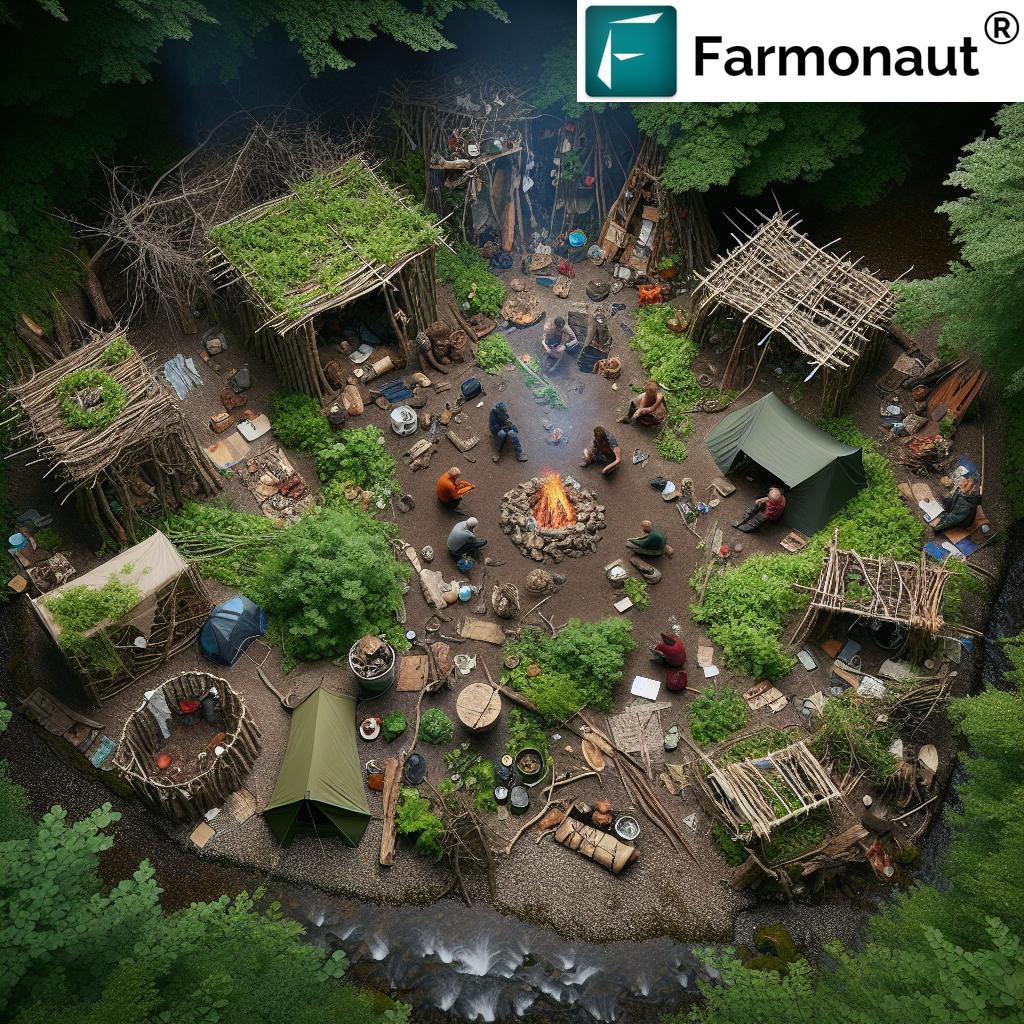Unleash Your Inner Nomad: The Vanishing Art of Wild Camping and Wilderness Survival
In an era of glamping and luxury RVs, the raw, untamed spirit of wild camping and wilderness survival is slowly fading into obscurity. Yet, for those who yearn to reconnect with nature and embrace the simplicity of outdoor living, the allure of nomadic camping remains as potent as ever. This comprehensive guide delves into the world of primitive camping techniques and off-grid living, offering a roadmap for modern adventurers to rediscover the freedom of the great outdoors.

The Decline of Traditional Camping: A Call to the Wild
As we witness the traditional camping decline, it’s crucial to understand the factors driving this shift and the importance of preserving these time-honored practices. The convenience of modern campgrounds and the allure of technology have gradually eroded the appeal of rugged, self-reliant camping experiences. However, the benefits of embracing wild camping techniques extend far beyond mere nostalgia.
- Reconnection with nature
- Development of self-reliance skills
- Escape from digital overwhelm
- Physical and mental health benefits
By learning and practicing wilderness survival skills, we not only preserve a vital part of our outdoor heritage but also equip ourselves with the tools to thrive in challenging environments. This knowledge becomes increasingly valuable in an unpredictable world, where the ability to adapt and survive off the grid can make a significant difference.
Embracing the Nomadic Outdoor Living Lifestyle
The concept of nomadic outdoor living harkens back to our ancestors’ way of life, offering a profound sense of freedom and connection to the land. This lifestyle, often referred to as the tramp lifestyle, involves constant movement and a deep reliance on nature’s resources. While it may seem daunting at first, embracing this way of life can be incredibly rewarding.
To truly experience the essence of nomadic camping, consider these key aspects:
- Minimalism: Carry only what you need
- Adaptability: Learn to thrive in various environments
- Self-sufficiency: Master basic survival skills
- Environmental awareness: Leave no trace and respect nature
For those interested in exploring this lifestyle further, the Farmonaut app offers valuable insights into local terrain and weather conditions, essential for planning your nomadic journey.

Essential Wilderness Survival Skills for the Modern Nomad
Mastering wilderness survival skills is crucial for anyone venturing into the world of wild camping. These skills not only ensure your safety but also enhance your overall outdoor experience. Here are some fundamental skills every aspiring nomad should develop:
1. Crafting Temporary Shelters
The ability to create temporary shelters using natural materials is a cornerstone of wilderness survival. From simple lean-tos to more complex structures, learning to build a shelter that protects you from the elements is essential. Key considerations include:
- Location selection (dry, flat ground, away from potential hazards)
- Material gathering (branches, leaves, bark)
- Basic construction techniques (A-frame, debris hut, snow cave)
2. Foraging for Food: Nature’s Grocery Store
Foraging for food is an invaluable skill that can supplement your diet and provide essential nutrients in the wild. However, it’s crucial to approach this practice with caution and proper knowledge. Some tips for safe foraging include:
- Learn to identify edible plants in your region
- Understand poisonous look-alikes and avoid them
- Practice sustainable foraging to preserve ecosystems
- Supplement your knowledge with a reliable field guide
For those interested in exploring wild food sources, the Farmonaut Satellite API can provide valuable data on local vegetation and growing conditions.
3. Fire-Starting Techniques
The ability to start and maintain a fire is crucial for warmth, cooking, and signaling in emergency situations. Master these fire-starting methods:
- Friction-based methods (bow drill, hand drill)
- Ferrocerium rod and striker
- Magnifying glass or lens
- Battery and steel wool
Primitive Camping Tips for the Aspiring Nomad
Embracing primitive camping techniques allows you to fully immerse yourself in nature and develop a deeper connection with your surroundings. Here are some primitive camping tips to enhance your wild camping experience:
- Leave No Trace: Practice responsible camping by minimizing your impact on the environment.
- Natural Navigation: Learn to navigate using the sun, stars, and natural landmarks.
- Water Purification: Master various methods of purifying water from natural sources.
- Primitive Cooking: Experiment with cooking methods that don’t rely on modern equipment.
- Wildlife Awareness: Understand local wildlife and practice safe coexistence.
For more detailed information on primitive camping techniques, check out the Farmonaut API Developer Docs, which offer insights into environmental factors that can affect your camping experience.
Rural Camping Experiences: Bridging the Gap
Rural camping offers a middle ground between traditional campgrounds and full-fledged wilderness camping. These experiences provide an excellent opportunity to practice your skills in a slightly more controlled environment. Benefits of rural camping include:
- Access to basic amenities if needed
- Opportunities to interact with local communities
- Diverse landscapes for exploration
- Chance to support rural economies
To find the best rural camping experiences in your area, consider using the Farmonaut app, available for both Android and iOS devices.
Embracing the Off-Grid Camping Lifestyle
The off-grid camping lifestyle represents the pinnacle of self-reliance and connection with nature. While it may seem challenging at first, the rewards of living off the grid are immeasurable. Here are some key aspects to consider when embracing this lifestyle:
- Energy Independence: Utilize solar panels, wind turbines, or other renewable energy sources.
- Water Conservation: Implement rainwater collection systems and practice water-saving techniques.
- Waste Management: Learn composting and other eco-friendly waste disposal methods.
- Sustainable Food Production: Develop skills in foraging, fishing, and small-scale agriculture.
By mastering these aspects of off-grid living, you’ll not only reduce your environmental impact but also gain a profound sense of self-sufficiency and connection to the natural world.
Conclusion: Rekindling the Spirit of Adventure
As we’ve explored the vanishing art of wild camping and wilderness survival, it’s clear that these skills and experiences offer far more than just a way to spend time outdoors. They represent a path to self-discovery, resilience, and a deeper connection with the natural world.
By embracing nomadic camping, mastering wilderness survival skills, and adopting primitive camping techniques, we not only preserve valuable knowledge but also open ourselves up to transformative experiences. The journey of the modern nomad is one of continuous learning, adaptation, and growth.
As you embark on your own wild camping adventures, remember that the skills and mindset you develop will serve you well beyond the campfire. They will instill a sense of confidence, resourcefulness, and appreciation for the simple things in life.
So, pack your bag, step off the beaten path, and unleash your inner nomad. The wilderness awaits, ready to teach, challenge, and inspire those brave enough to answer its call.
















